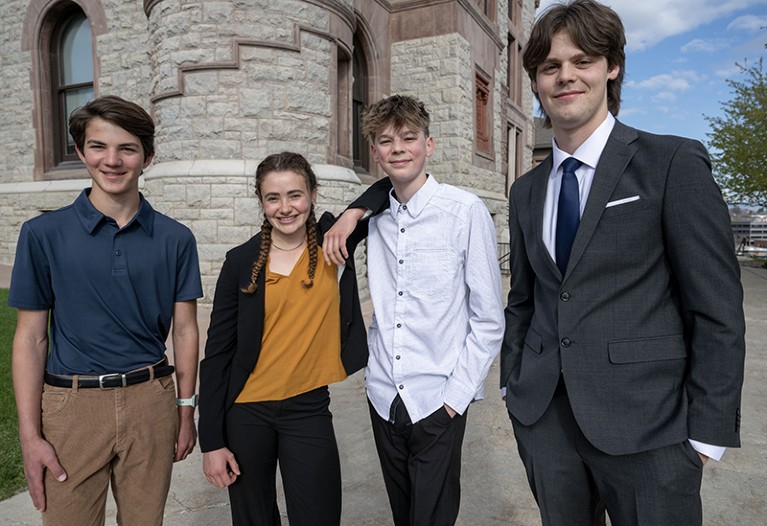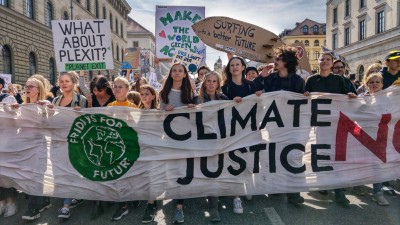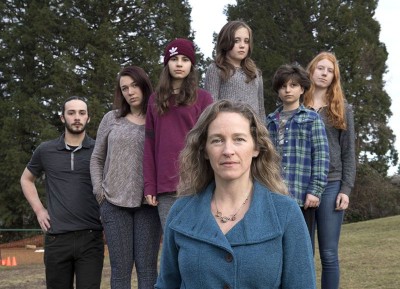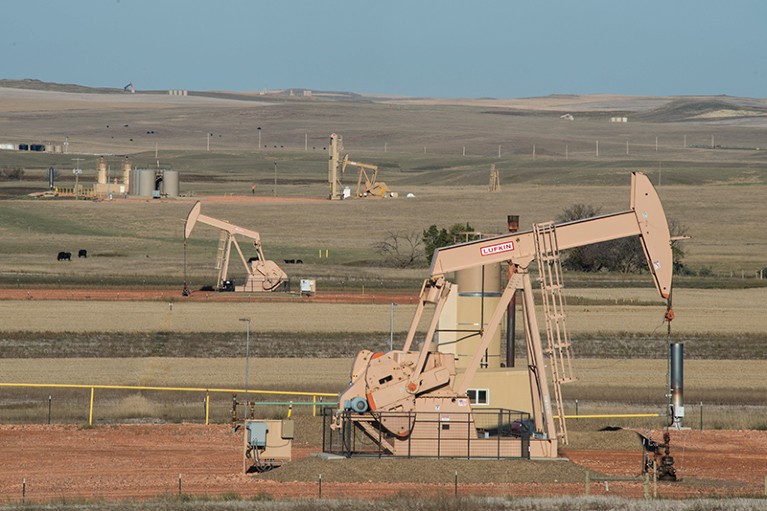
Mica (from left), Taleah, Badge and Lander are four of the young people taking Montana to court over its support of fossil fuels.Credit: Robin Loznak/ZUMA Press Wire/Shutterstock
Climate science will get its day in court this week as lawyers for Rikki Held and 15 other young people argue that the state of Montana’s environmental policies promote fossil fuels, in violation of their right to a ‘clean and healthful environment’. That right is enshrined in the state’s constitution, making the climate case — Held v. Montana — the first of its kind to go to trial in the United States, and the latest example of frustrated citizens worldwide taking legal action to force their governments to act on climate change.

Climate science is supporting lawsuits that could help save the world
Numerous climate lawsuits have been filed in the United States, targeting everything from government energy policies to businesses for their responsibility to pay for damages from climate pollution. In the lawsuit against Montana, a large producer of oil, gas and coal, the plaintiffs argue that the state’s long-standing support of fossil fuels violates their fundamental rights under the state constitution. Climate science will feature prominently during the trial, as Kathy Seeley, a Montana judge, seeks to determine whether the state’s policies are “a substantial factor” in driving climate impacts such as droughts, wildfires and extreme weather.
“This is what I expect will be the battle of the experts,” says Michael Burger, executive director of the Sabin Center for Climate Change Law in New York City. In particular, Burger thinks that witnesses will use the field of climate-attribution science — which seeks to quantify climate change’s impact on specific weather and climate events — to bolster the youths’ case.
The trial is set to begin on 12 June at the Lewis and Clark County District Courthouse in Helena and run for 10 days.
A global movement
Table of Contents
The modern climate litigation movement dates back roughly two decades. One of the most notable cases began in 2013, when a group of citizens in the Netherlands sued their government for failing to take preventive measures against climate change. The court ruled in their favour in 2015 and ordered that the country reduce in greenhouse-gas emissions by 25% by 2020, compared with 1990 levels. Other cases have followed in Europe and beyond, but similar efforts have struggled to gain ground in the United States.

US Supreme Court allows historic kids’ climate lawsuit to go forward
In 2015, lawyers with the non-profit legal organization Our Children’s Trust, based in Eugene, Oregon, filed Juliana v. United States, the first major constitutional climate case in the country, on behalf of 21 young people. The lawsuit sought to force the federal government to reduce greenhouse-gas emissions. The US Supreme Court halted the case in 2018, and two years later, a federal appeals court dismissed the case on the grounds that courts do not have the authority to craft climate policy, which is instead the job of policymakers. However, on 1 June, a federal court ruled that the youths, now aged 15–27, could once again move forward with their case, which now seeks a declaration that US energy policy is unconstitutional.
Held v. Montana, also supported by lawyers with Our Children’s Trust, comes first, however, and could be a bellwether for that case. Seeley has limited the potential outcomes of Held, ruling that it is not within her power to order the state to change its energy and climate policies. Like Juliana, the outcome could be an acknowledgement that the state’s policies are unconstitutional, without an order that anything be necessarily done in response.
“The decision in this case ultimately will be part of a larger set of decisions that can help shape the course of climate, governance and the future,” Burger says.
Science in the court
Whereas Juliana will hinge on how climate change is affecting the United States, this week’s case will be focused on Montana’s citizens.
A state climate assessment conducted in 2021 found that Montana’s rate of warming has exceeded that of the United States as a whole since 1895. The state has also been facing climate-related droughts, floods, wildfires and unexpected extreme weather events with real impacts on people’s health and livelihoods, according to the report.

Oil wells dot the wheat fields in eastern Montana.Credit: William Campbell/Corbis via Getty
The three areas of focus in this case will probably be extreme heat, reduced air quality from smoke and wildfires and how weather events affect human health, says Paul Lachapelle, a climate-policy scientist at Montana State University in Bozeman, and co-author of the assessment. “It’s going to be incumbent on the plaintiffs to talk about these aspects of the science.”
Thanks to a growing body of evidence over the past two decades, it’s getting easier to link specific weather events and phenomena, such as storms and droughts, to global warming, says Delta Merner, lead scientist at the Science Hub for Climate Litigation at the Union of Concerned Scientists in Baltimore, Maryland.
Merner says that two kinds of climate-attribution science could be in play during the trial: event attribution and source attribution. The first focuses on climate change’s role in driving a given climate or weather event, and the second seeks to assign responsibility for the greenhouse-gas emissions that are changing the climate.
Discussing how industries and policies in Montana are contributing to the state’s greenhouse-gas emissions will be key to the plaintiffs’ case. “It’s important that we understand what is the actual source of the carbon that’s driving the impacts that the youth are facing in Montana,” Merner says.
State opposition
Up to this point, the state legislature has been trying to keep the case out of court. One of its latest attempts was repealing a 30-year-old energy policy that prioritized the development of the state’s fossil-fuel industry. This narrowed the scope of the trial, but Seeley has ruled that the youths’ complaints about the state’s environmental-policy act, which governs environmental assessments of projects ranging from road construction to energy development, can still be heard.
If the youth prevail in their case, the state legislature might be forced to rescind aprovision that was recently added to the environmental-policy act that prohibits state officials from considering climate change when conducting environmental impact assessments, Burger says.
No matter the outcome, the trial is providing a space for youth to be heard, Merner says. “They’re really taking the pursuit of justice to the courts, looking to be able to address those who are responsible for climate change.”
